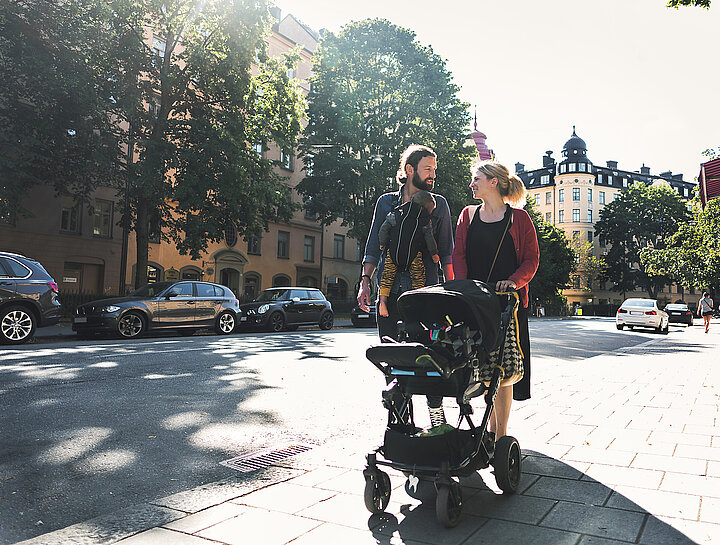
Pregnancy and Childbirth
Austria's first-class healthcare also includes excellent medical care for expectant mothers and their babies during and after pregnancy.
During pregnancy, you are entitled to maternity protection and therefore protection against dismissal and redundancy. This chapter provides you with the most important information about pregnancy, childbirth and the associated social benefits.
Pregnancy & maternity protection
We would like to recommend a very helpful website that provides excellent guidelines for all stages of pregnancy:
Digital BabypointBabypoint () helps you organize tasks related to pregnancy and birth with a personalized checklist. After an initial registration, you can also use the "First issue of certificates" service to apply for a birth certificate, proof of citizenship and confirmation of registration.
Maternity protection
As soon as the employer becomes aware of an employee's pregnancy, he/she must comply with the protective provisions of the Maternity Protection Act (Mutterschutzgesetz – MSchG).
The employee must inform the employer of the expected date of birth. The employer may request a medical certificate.
The protective provisions of the Maternity Protection Act apply to:
-
Blue-collar workers
-
Salaried employees
-
Apprentices
Protection during and after pregnancy at a glance
-
The expectant mother enjoys protection against dismissal and termination of employment. As a rule, this protection ends 4 months after the birth of the child. If you go on maternity leave after the protection period, the protection against dismissal continues until 4 weeks after the end of maternity leave. Protection against dismissal means that the employer may only give notice of dismissal with the prior approval of the Labour and Social Court.
-
There is an absolute prohibition on employment during the protection period. This usually lasts from 8 weeks before to 8 weeks after the birth. However, in the event of a premature birth, multiple birth or caesarean section, the protection period lasts until 12 weeks after the birth.
-
An expectant mother may not be employed beyond the period of 8 weeks before giving birth if the life or health of the mother or child would be endangered in the workplace. In this case, a specialist medical certificate from a doctor confirming this must be submitted (individual employment prohibition).
-
The employer is exempt from paying remuneration during the period of the employment prohibition. The pregnant woman or mother receives an average salary from the ÖGK (so-called maternity allowance).
-
The absolute and individual employment prohibition also applies to freelance employees.
Self-employment and pregnancy
If self-employed women are expecting a child, they are entitled to maternity benefits in the same way as employees.
Further information on maternity protection.
You can find more information here.
Parent-Child Passport examinations
Once a pregnancy has been established, every pregnant woman resident in Austria receives a Parent-Child Passport from her doctor.
The passport is used for preventive health care for pregnant women and infants up to the age of five.
The examinations provided for in the Parent-Child Passport program are an opportunity for the early detection and timely treatment of illnesses and for monitoring the child's development. All pregnant women and parents of small children should therefore take the opportunity to ensure the best possible preventive care for mother and child and have these examinations carried out.
The examinations are carried out by general practitioners or the respective specialists. The performance of these examinations during pregnancy and up to the child's 14th month of life is a prerequisite for receiving the full amount of childcare allowance (with the exception of pregnancy ultrasounds, hip ultrasounds and midwife consultations).
The ultrasound examinations included in the Parent-Child Passport program serve to monitor the child's development and to detect multiple pregnancies. Ultrasound examinations can provide additional information over and above the clinical examination. This means that abnormalities can be detected at an early stage and taken into account or treated as the pregnancy progresses.
- 01
Midwife consulting during pregnancy
Between the 18th and 22nd week of pregnancy, there is the option of a consultation with a midwife. The consultation includes information on the course of pregnancy, birth, the puerperium, breastfeeding, healthy behavior during this period and other support options. Midwives who provide consultations as part of the Parent-Child Passport can be found herehere ().
- 02
Oral glucose tolerance test (sugar load test)
Diabetes occurs temporarily in around five to ten percent of pregnant women as a result of metabolic stress during pregnancy. Unrecognized gestational diabetes causes the unborn child to gain a lot of weight and height and to have problems adjusting after birth. A sugar load test as part of the laboratory examination in the 25th -28th week of pregnancy can detect gestational diabetes and, if necessary, ensure closer monitoring of the pregnant woman and a change in diet. Sometimes insulin treatment may also be necessary. The test should not be carried out after certain surgical procedures on the gastrointestinal tract (e.g. bariatric surgery).
Brochures and Further Information
Brochure for the mother-child pass.
Download guide for completing the Mother-Child Passport - obstetric section (July 2020).
Birth preparation courses
Birth preparation courses are offered throughout Austria by the following institutions and people, for example: Maternity departments in hospitals.
Adult education centers (→ Association of Austrian Adult Education Centers).
Pregnancy gymnastics
Pregnancy gymnastics is offered throughout Austria in the maternity wards of hospitals, at midwives (→ Austrian Board of Midwives).
Parent-child centres in Austria.
Further Information
Doctor search in German only (→ Österreichisches Gesundheitsportal).
Clinic search in German only (→ BMASGPK).
Counselling and preparation for birth (→ Österreichisches Gesundheitsportal).
Birth
Giving birth in a country other than your own may lead to stress, but Austria offers one of the best health care systems during and after birth.
Nevertheless, there are many questions that need to be answered: Is it preferable to give birth in a hospital with a team of doctors and midwives or with just a midwife?
Which hospitals are particularly well equipped for childbirth? Should the child perhaps be born at home after all? What support measures are available during the birth?
All medical procedures in connection with the birth, including planned or emergency caesarean sections, are covered by public health insurance.
Further Information
More information on giving birth in Vienna.
Clinic search: Enter the zip code and find a maternity clinic near your place of residence.
Bureaucratic procedures after birth
The birth of a child necessarily involves a number of administrative procedures so that the parents receive the most important documents for their child.
In this chapter you will find an overview of this topic to help you. We have prepared a checklist for you, where you will find a link to detailed information on deadlines, the required documents, etc. for each authority.
All the official procedures listed here (submission of declarations) can be completed after the birth at the registry officeregistry office () where the child was born. As it usually takes some time to prepare the documents, they cannot usually be issued immediately. The checklist below is intended to give you a step-by-step overview of the official procedures to be carried out.
The Digital Babypoint supports expectant mothers and fathers with a personalized pregnancy and birth checklist. You can initiate the issuance of documents like birth certificates, Austrian citizenship proofs, and registration confirmations online through the Digital Baby Point platform.
Some hospitals (in Vienna, for example, the General Hospital and the SMZ-Ost/Donauspital) have a branch office of the registry office (so-called "Babypoint"). In some other hospitals (without a branch office of the registry office), special baby certificate services are offered, such as the forwarding of required documents from the parents to the registry office.
Further Information
More information on the Digital Babypoint.
More information on the birth certificates for newborns.
Required documents
The following is a complete list of the documents that must be brought to the registry office if all of the above-mentioned official procedures are to be completed following the birth. The documents required only for the respective official procedure can be called up under the specific link. Documents to be submitted in individual cases (e.g. consent of the legal representative for an acknowledgment of paternity of a minor father) are not listed here.
- Official photo IDs of the child's parents
- Birth certificates of the child's parents
- Married parents: Marriage certificate
- Proof of citizenship of the child's parents
- If residing abroad: proof of the parents' main place of residence
- Possibly divorce certificate with confirmation of the legal validity of the divorced marriage (you can obtain this from the divorce court) or marriage certificate of the last marriage and death certificate of the spouse
- Partnership certificatePartnership certificate (), if applicable
- Possibly proof of academic degrees of the child's parents
- Possibly proof of acknowledgement of paternity
- Possible notification of name change
Financial support before and after birth
The maternity allowance is intended to provide financial support for the expectant mother around the time of the birth and is paid as a replacement for the loss of income (so-called “Wochengeld”). The maternity allowance is paid monthly in arrears.
The maternity allowance is paid in the following period:
- eight weeks before the expected date of birth,
- on the day of delivery and
-
eight weeks after the birth (in the case of multiple, premature or caesarean births: twelve weeks after the birth). A premature birth is deemed to have occurred if the birth takes place before the 37th week of pregnancy.
If the specialist doctor, the labor inspector or the public health officer has imposed a ban on employment before the start of the protection period or beyond, the maternity allowance is also paid for the duration of this ban on employment.
- 01
Family Bonus Plus
The Family Bonus Plus is calculated depending on the gross income per child. An annual maximum amount of € 2,000 applies for each child up to the age of 18 (since July 2022)
For children aged 18 and over, the Family Bonus Plus amounts to € 700 (2025) if family allowance is still being received for this child.
The Family Bonus Plus is a tax deduction that directly reduces your tax burden. You are entitled to it if you have unlimited tax liability in Austria and receive family allowance for the child. Since 2019, the Family Bonus Plus has replaced the child allowance and the tax deductibility of childcare costs.
- 02
Parental leave
While parental leave is a leave of absence from work in return for no pay, childcare allowance is a financial benefit from the state.
Parental leave begins at the earliest after the mother's ban on working after the birth of the child (protection period) or - if parental leave is shared - after the mother's or father's parental leave.
- 03
Sharing parental leave
The parental leave can be shared between the parents a maximum of twice - this is called the parental leave part. One period of parental leave must last at least 2 months. The employer must be notified in writing of the duration of parental leave. Please note the notification deadlines for parental leave. There are two options for notification, depending on whether the mother or father is claiming parental leave.
- If the mother claims the first part of parental leave, the notification period applies within the protection period after the birth of the child
- If the father claims the first part, the notification must be made within 8 weeks of the birth of the child
The parent claiming the 2nd or 3rd part of the leave must submit the notification no later than 3 months before the end of the part of the leave of the parent who was previously caring for the child.
- 04
School starting allowance
In September each year, all children between the ages of 6 and 15 receive a starting school allowance of € 121.40 (2025) per child in addition to the family allowance. A separate application is not required.
Further Information
More information on the Family Bonus Plus.
The family allowance is generally tax-free in Austria and is therefore not taken into account in the employee's tax assessment.
Overview of the two models of childcare allowance.
More details and all calculators for various family benefits can be found here.

